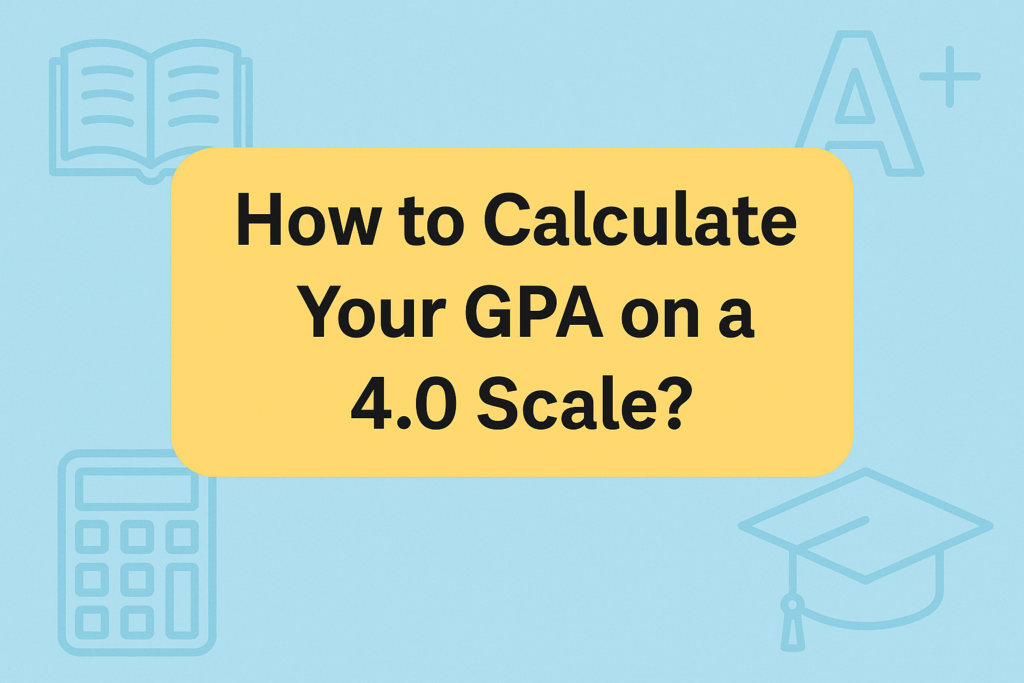GPA, or Grade Point Average, is a number that sums up how well you're doing in school. You take each class's grade, turn it into a point value (like A = 4.0), multiply that by the class credits, and then divide by the total credits. It sounds a bit much—but GPA calculators handle this in seconds.
It depends on the scale your school uses. A 92% might count as an A or an A-, depending. Most schools have a chart—something like 90–100% = 4.0. If you're unsure, using a percentage-to-GPA calculator is probably the easiest way to get a quick estimate.
An unweighted GPA keeps it simple—every class counts the same. A weighted GPA boosts more challenging courses like AP or honors. So, an A in a regular class is 4.0, but in an AP class, it could be 5.0. Colleges like to see how you scored and how challenging your classes were.
Cumulative GPA is just your overall GPA across all semesters. Add your grade points from every class, divide by total credits, and there it is. If it feels messy, don't worry—most students use a cumulative GPA calculator to save time (and sanity).
It depends on the college. A GPA above 3.7 is strong for top-tier schools. For many public universities, 3.0 to 3.5 is solid. That said, your GPA isn't the whole story—colleges also care about course difficulty, test scores, and, sometimes, just your story.
Once per semester works for most students. But if you're aiming for a specific scholarship or program or are close to a GPA threshold, you might want to check more often. Some students track it monthly—just to stay aware, not obsessed.
It usually does. In many schools, if you retake a course and get a better grade, that new grade replaces the old one. Other schools average the two. Either way, retaking a class you didn't do well is often smart if you're trying to raise your GPA.
They usually don't. If you pass, you get credit—but no grade points. So, your GPA stays the same. If you fail, it depends. Some schools don't count it, others do. It's a safe option to try something new without risking your average.
On a regular 4.0 scale, the max is 4.0. But with weighted scales, it can go higher—like 4.3, 4.5, even 5.0. It all depends on how your school counts AP or honors classes. Still, colleges usually recalculate your GPA their way, so don't worry too much about chasing a perfect score.
Not on transcripts. Schools usually report your GPA exactly as it is, like 3.47—not 3.5. In casual conversation or résumés, people often round to the nearest tenth. Just be honest if you're submitting it formally for college or job apps.
First, convert each grade into a point value—like A = 4.0, B = 3.0. Multiply that by how many credits the course is worth. Add all the grade points together, then divide by the total credits. That's your GPA. Most students use an online GPA calculator—it’s quicker and avoids math mistakes.
In most schools, you'll need at least a 2.0 GPA to graduate—that's about a C average. But not every district follows the same rule. Some require more, especially for specific programs or honors diplomas. If unsure, your school counsellor can clear it up in minutes.
They can help—if your school uses a weighted GPA. Advanced classes like AP or IB usually give extra grade points. So, instead of an A being 4.0, it might count as 5.0. That boost can raise your overall GPA, but only if you do well in the course.
The U.S. average hovers around 3.0, which is a B. Of course, it depends on where you live and what kinds of classes you take. Students aiming for competitive colleges often fall in the 3.7–4.0 range, but there's no single "right" number.
It's pretty important—but not everything. GPA plays a role in college admissions, scholarships, and class rank. But schools also look at things like extracurriculars, course rigor, and personal growth. A perfect GPA won't guarantee acceptance—and a lower one won't automatically keep you out.
It works just like in high school. Turn each grade into points, multiply by credit hours, add those, and divide by your total credits. Some schools calculate it for you. If not, there are GPA calculators online that do the heavy lifting once you plug in the numbers.
It varies by college, but most score 3.5 or higher. You usually need a full course load and no grades below a B. Some schools go stricter; others might be more flexible. You can usually find the exact policy on your school's website.
In a big way. Most scholarships and grants come with minimum GPA requirements. Drop below that number, and your aid could be at risk. The magic number is often 2.0, but some programs ask for more. It's always smart to read the fine print before relying on long-term aid.
Generally, colleges require at least a 2.0 to graduate. Some majors set higher standards—like 2.5 or above—especially for specialized programs. Review your program's graduation checklist or talk to your academic advisor if unsure. They'll give you the exact number.
You don't have to fix it overnight. Start with the classes you're in now—aim for A's in higher-credit ones. Retake classes you bombed if that's allowed. Go to office hours. Use tutoring services. Small wins add up over time. GPA is slow to change, but it can move.
Your course names, final grades, and how many credits each class was worth. If you want a quick estimate, you can keep credits equal. But it's better to be precise for college GPA, where courses can have different weights.
Most of the good ones do. You'll usually be able to switch between scales—like 4.0 or 10-point systems. Some also convert percentages to letter grades automatically. Still, it's smart to double-check which scale your school uses before you trust the output.
They should—and most do. The number of credits tells the calculator how much weight to give each class. A course worth 4 credits affects your GPA more than one worth 1. If your calculator doesn't ask for credits, it's probably just giving you a rough average.
Yes, there are plenty. Just search "GPA calculator" in the App Store or Google Play. Most online calculators also work great on your phone's browser. If you use one often, bookmarking it on your home screen works like an app.
Quickly divide your score by the maximum (like 85 ÷ 100 = 0.85), then multiply by 4. That gives you a rough 4.0 equivalent. But truthfully, every school does this differently—especially internationally. Always check if the college you're applying to has its conversion formula.
It's not an exact science. A First Class in the UK usually falls somewhere between a 3.7 and 4.0 GPA. A 2:1 might be around 3.3 to 3.6. But U.S. schools don't always translate it directly—they'll often look at your entire record, not just the final number.
Most schools in India use percentages, not GPA. So, instead of a 4.0 system, you'll usually see scores like 78%, 85%, etc. People often use charts where 75% and above equals a 4.0 for conversions. But honestly, it depends on the college you're applying to—they may have their system.
You can estimate it. Multiply your GPA by 25 to get a rough percentage. So if your GPA is 3.4, that's about 85%. But this is just a ballpark method—it's not official. If a university asks for a percentage, checking their conversion rules is best.
They usually don't just take it as-is. Most will re-evaluate your GPA using their scale, looking at your full transcript, course difficulty, and even grading practices in your home country. So, while GPA matters, context matters just as much—sometimes more.
Sometimes. It might arise if you head to grad school or apply for your first job. But once you've worked a while, it stops being the headline. Employers start caring more about your skills, experience, and how you've grown—less about what your transcript says.
It varies. Some companies want a 3.0. Bigger firms—especially in finance, consulting, or tech—might ask for 3.5+. But don't let that stop you. If your GPA isn't perfect, but you've got strong skills or a solid recommendation, you're still in the game.
Some do, especially for early-career roles. If a job posting mentions GPA, they'll probably want proof. Others won't ask at all. Once you've got some experience, most companies stop focusing on numbers and start looking at what you've done.
It matters, especially for competitive programs. A 3.0 is usually the minimum, but strong programs want to see higher—think 3.5+. Still, admissions teams look at your whole story: test scores, recommendations, your statement. A solid narrative can carry more weight than a perfect GPA alone.
In the beginning, yeah, it can be. Employers often use GPA as a quick way to narrow down candidates. But your GPA starts fading into the background after that first job or internship. Experience, teamwork, and problem-solving usually say more than numbers ever could.
Focus on the next test or assignment—not the whole semester. Little wins stack up. Use office hours. Ask for help sooner. Retake a low-grade course if your school lets you. GPA climbs slowly, but it does climb. Don't aim for perfect—aim for better.
It depends on how far along you are. If you've only completed a few semesters, you've got room to grow. But if you're deep into your degree, progress will be slower. Still, consistent effort can move the needle over time, especially in high-credit courses.
Yes—if your school includes them in your GPA calculation. Summer classes are often more focused, which helps some students stay on track. A good grade in a 3- or 4-credit course can push your GPA upward.
If your school replaces the old grade, then yes—it's one of the fastest ways to raise your GPA. Even if both grades stay, showing improvement still counts for something. Just check your school's policy first. Not all colleges handle repeats the same way.
A dropped class, usually marked "W," doesn't hurt your GPA. But it stays on your record. One or two is no big deal. More than that? Admissions officers might notice. If you're thinking about dropping out, talk to your advisor. Timing matters.
It's just the system your school uses to turn grades into numbers. On the usual 4.0 scale, an A is 4.0, a B is 3.0, and so on. Some schools also use pluses and minuses—or even give extra weight for honors or AP classes, which can bump the scale up to 5.0.
Each grade has its point value. For example, an A- might be 3.7, B+ could be 3.3. You plug those values into the same GPA formula—add the grade points and divide by total credits. It's the same idea, just with a bit more detail.
Not your GPA itself—grades are grades. But solid extracurriculars can still help your college or scholarship chances. If your GPA isn't where you want it, involvement in leadership roles or community work can show you're more than just numbers on a transcript.
GPA usually refers to one semester or term. CGPA is a "cumulative GPA," which means your overall average across multiple semesters. In some countries, CGPA is the main term used. In the U.S., they both show up depending on the context.
Most scholarships have a GPA requirement—often 3.0 or higher. Some just ask for "good academic standing," which can vary. A high GPA can help, but a strong essay or a powerful recommendation can sometimes tip the scale even more.
It's usually when your GPA drops below 2.0. Schools use it as a heads-up, not a punishment. You might have to meet with an advisor, cut back on classes, or raise your GPA within a set time. It's a chance to get back on track—not the end of the road.




